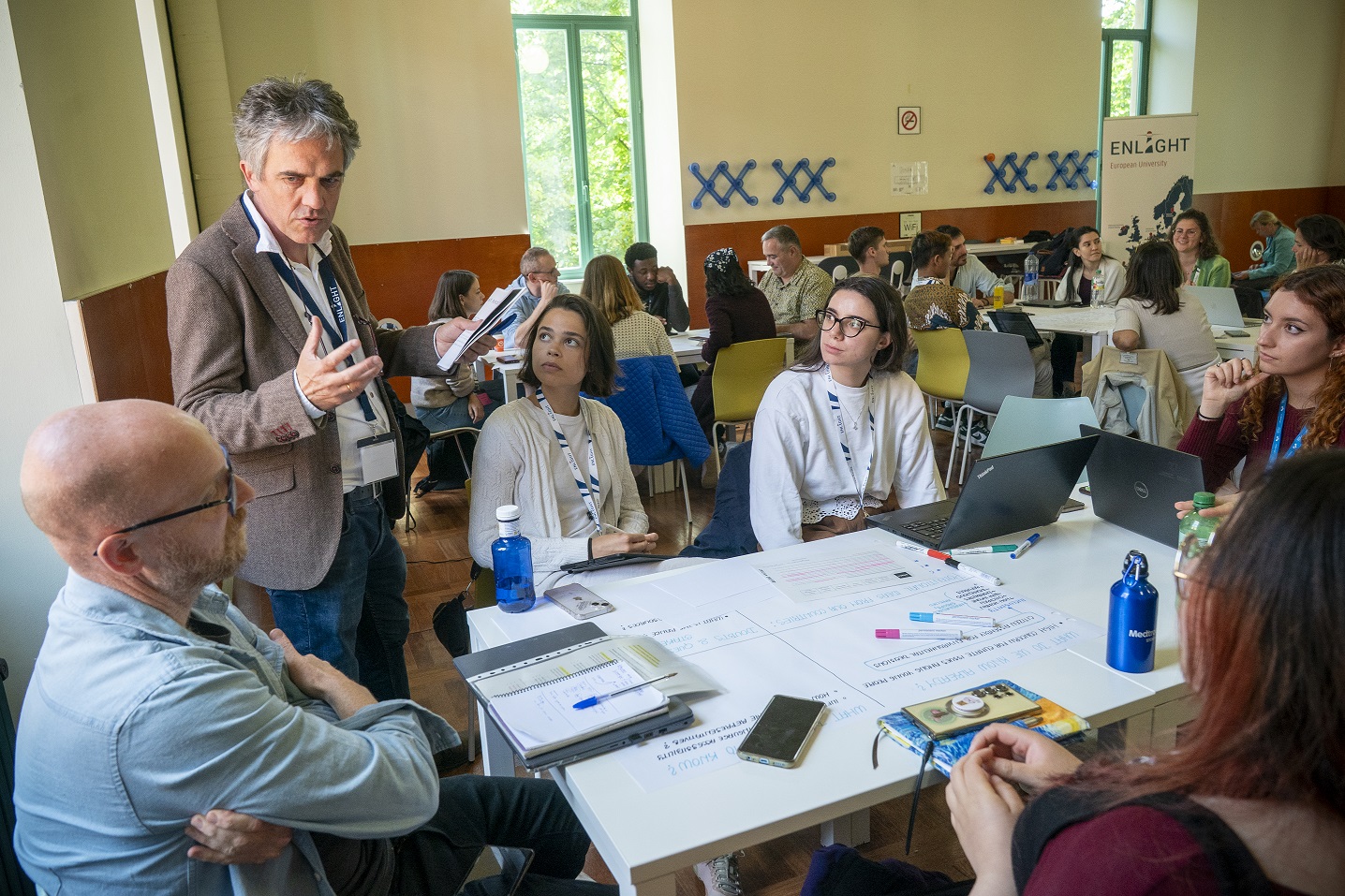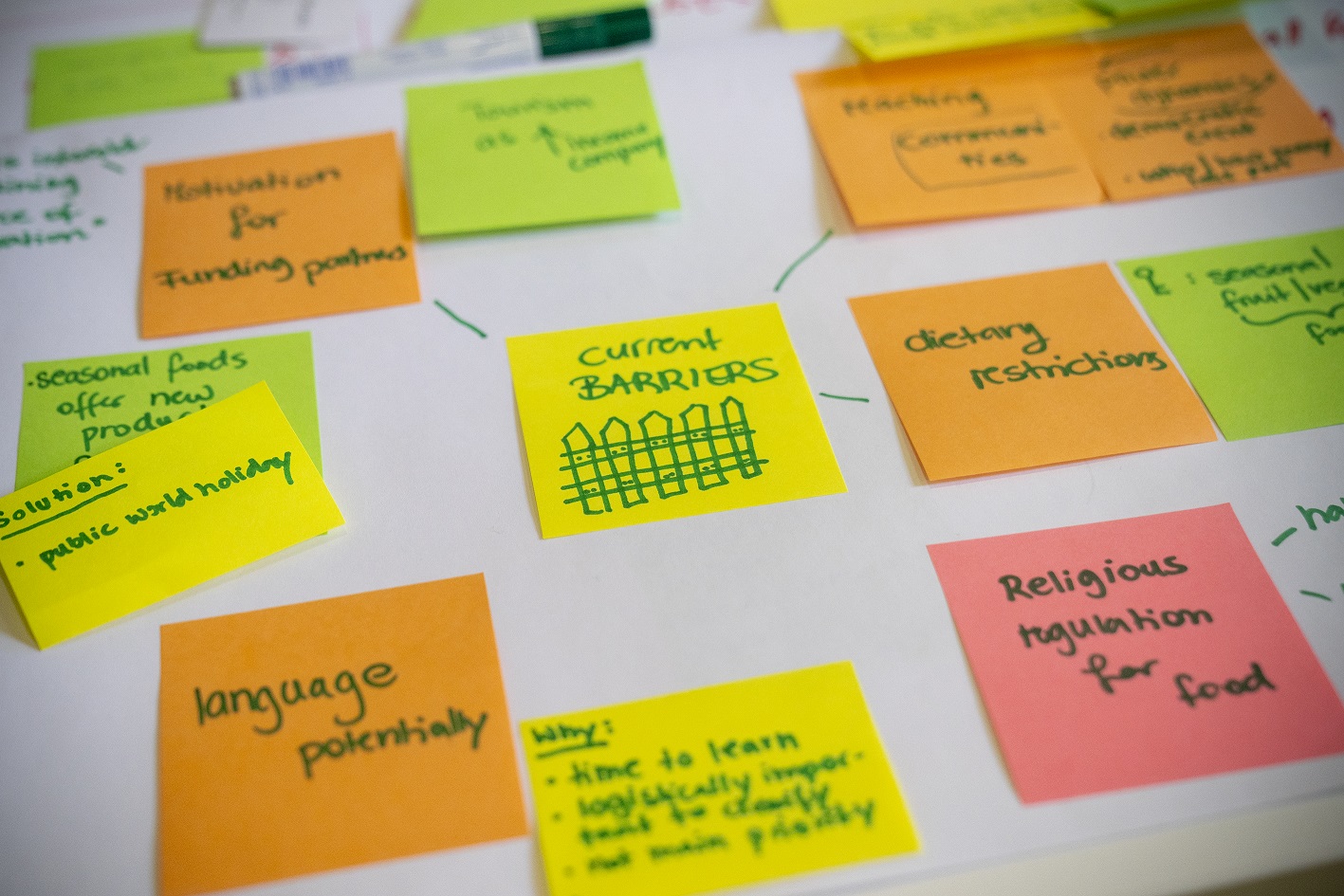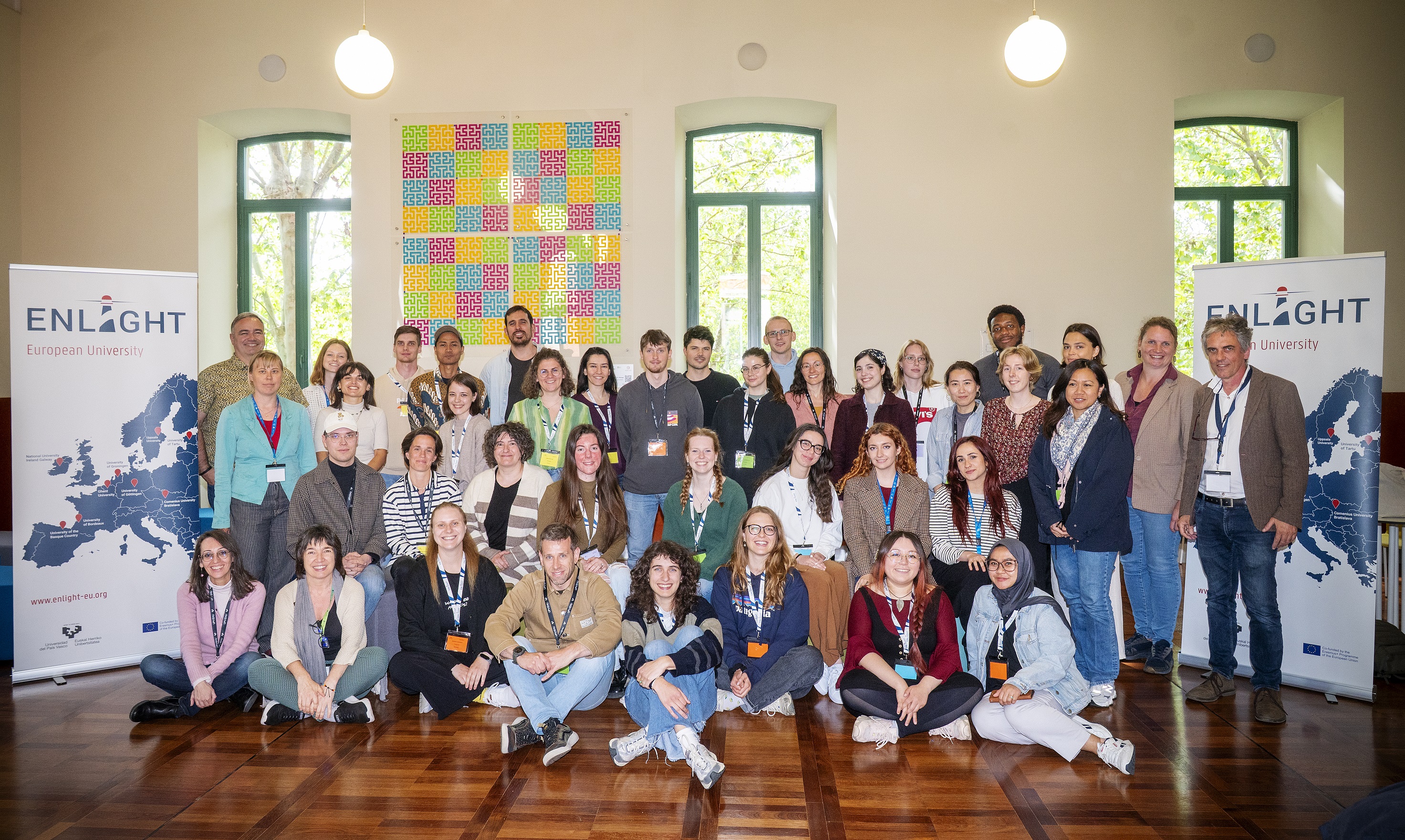FREDERIK VERBEKE // LECTURER // UNIVERSITY OF THE BASQUE COUNTRY
»ENLIGHT has an extraordinary potential to harness the richness of cultural and linguistic diversity across Europe«
Frederik Verbeke teaches French Philology at the Faculty of Arts of the University of the Basque Country. Acknowledged at the T&L Awards (Tartu, 2024) for his BIP course “Connecting Cultures”, he has also participated in other ENLIGHT joint academic activities and has highest hopes for the alliance.

Frederik Verbeke at the BIP Connecting Cultures
Frederik, you were born and raised in Ghent but you now live and work in the Basque Country. What circumstances made you end up in Northern Spain?
FREDERIK: I ended up in the Basque Country after an Erasmus exchange program in Italy. I was studying a Bachelor of Arts in Linguistics and Literature (French – Italian) at the University of Ghent and I went to the University of Trento for a year. Thanks to the connections that emerged between the mobility students, it was there that I first discovered the Basque Country, its culture, its language, and its people. The beginning of a very profound love story that took me to the Basque Country 25 years ago.
You have taken part in several ENLIGHT joint activities, from teaching in an early summer school in Göttingen to organizing a new BIP at the UPV/EHU, how did you first know about the alliance and how have your connections increased across the partners, throughout these activities?
FREDERIK: As soon as ENLIGHT was launched in 2020, I was so excited to see my alma mater, Ghent University, and the University of the Basque Country, embarking on such a large-scale adventure that, since then, I have not lost sight of ENLIGHT’s lighthouse and have been participating in various initiatives. In 2021, I participated in the first edition of the Teaching and Learning Conference in Ghent with a presentation on “Multilingual Challenge Based Learning in a Cross Border Context”. The same year, Professor Petra Broomans from the University of Groningen invited me to join the Cultural Transfer Research Network that brought together researchers from various ENLIGHT partners. At the same time, Professor Guido Mensching from the University of Göttingen invited me to participate in the ENLIGHT summer school “Identity and Contested Memory Construction of Migrant/Diasporic Communities in the Mediterranean”, which took place in Göttingen in the summer of 2022. In May of that same year, I went to Tartu for the first time to participate in a conference on “Museums as Spaces of Cultural Translation and Transfer”. There, in Tartu, at a working meeting of the Cultural Transfer group, the idea of organizing a BIP arose. It would take two years to make the project a reality. The course on Challenge Based Education organized by ENLIGHT helped to conceive the methodological part. From March to May 2024, the first edition of the BIP Connecting Cultures took place, with an on-site week organized at the Faculty of Arts of the University of the Basque Country, in collaboration with professors from the Universities of Galway, Groningen, Tartu and Ghent. An extraordinary experience, both for the teaching staff and for the students and external sociocultural agents. In May 2025, we are hosting the onsite week of the second edition of this BIP, hoping to expand this course´s lifespan and buttress the cooperation scheme among our group of academics.
The BIP course you recently hosted was the 2024 UPV/EHU candidate to the T&L awards: did you enjoy the conference?
FREDERIK: I’ve had a wonderful experience at the Teaching and Learning conference. Going to Tartu as the UPV/EHU nominee for the Teaching and Learning Awards with the BIP on Connecting Cultures was something very special and emotional because the idea of the BIP had arisen in this very place two years ago. It was like closing a circle. And we even managed to get on the podium, even though the other nominees all had so magnificent and excellent projects. Seeing the UPV/EHU reach the podium of the T&L Awards for the first time with a course from the Faculty of Arts has been a moment of great satisfaction.
What is the biggest advantage or potential of ENLIGHT, according to you?
FREDERIK: The biggest advantage of ENLIGHT, in my view, lies in its extraordinary potential to harness the richness of cultural and linguistic diversity across Europe. It provides an opportunity to create complex, transnational learning situations that challenge students to think critically and solve problems in real-world scenarios. These immersive experiences are deeply enriching, as they push learners to confront the intricacies of collaboration across languages, cultures, and disciplines. This framework offers students and teachers an invaluable opportunity to step outside their comfort zones. It enables them to engage with different cultures, languages, and perspectives, helping them to visualize and grapple with the complexities of today’s world. ENLIGHT equips students and educators alike with the skills needed to navigate and thrive in an increasingly interconnected world. It transforms universities into living laboratories for diversity, complexity, and innovation.
And how about the most difficult challenges and barriers to build seamless cooperation among the partners?
FREDERIK: One of the most significant challenges stems from administrative and bureaucratic complexities. Universities across different countries operate under diverse legal frameworks, accreditation systems, and institutional policies, making it difficult to align academic programs and requirements. These differences can slow down the development of joint courses. Navigating such bureaucratic hurdles requires time, resources, and sustained commitment, which is not always easy. Faculty members often face heavy teaching and research loads, leaving little room for additional transnational initiatives. Additionally, there can be resistance from both teachers and students when it comes to stepping outside their comfort zones. They may feel hesitant or uneasy when working in complex transnational and multilingual environments. Addressing these challenges requires coordinated efforts and a willingness to rethink traditional academic practices.

Cultural agents facilitated the challenge-based learning dynamics throughout the week
Hopefully this living lab will become a springboard towards a learning community around CBE in the context of ENLIGHT
Would you say that ENLIGHT has had an effect in the way you develop your academic activity or your teaching competences?
FREDERIK: ENLIGHT has had a significant impact. Thanks to the alliance I have had the opportunity to experience CBE in the field of humanities and in the format of a Blended Intensive Program. Coordinating this course has been a huge and complex challenge, and a very enriching experience, thanks also to the 25 master's and doctoral students who have been deeply involved and have given very valuable feedback, and thanks to the team of professors who have generously collaborated.
Do you feel that you now interact more frequently with fellow academics from the other partners?
FREDERIK: Yes, of course. We started the online part with 5 teachers, from Galway, Groningen, Tartu and the Basque Country, but for the on-site week the number of teachers involved was doubled. New teachers wanted to participate and see first-hand how the course was run. The Teaching and Learning Conference in Tartu has provided another great opportunity to share experiences and to learn about other similar projects. At the University of the Basque Country we have launched a living lab (CBE i3lab) with the aim of connecting people and groups that experiment or research around Challenge Based Education. And hopefully this living lab will become a springboard towards a learning community around CBE in the context of ENLIGHT.
Imagine ENLIGHT in a midterm future: what would be your dream for the alliance?
FREDERIK:That collaborations between the various universities are intensified without losing sight of linguistic and cultural diversity. On the contrary, that this diversity is the basis for enriching any of the initiatives that are carried out. Connecting ENLIGHT’s cultures and languages to advance towards a more just and sustainable world.
What do you like to do in your free time?
FREDERIK: Reading, walking, gardening, cycling, listening music… Enjoy and take care of the treasures (natural, cultural, spiritual, gastronomic...) that surround me, and in the Basque Country there are many.
What is the best book you recently read?
FREDERIK: “L’Inexploré” by Baptiste Morizot, a philosophical exploration of humanity’s relationship with the living world, especially the non-human aspects of it. Morizot delves into what he calls “the unexplored” realms of the living world. This is not just about physical landscapes that humans haven’t explored but also the ethical and philosophical territories that have been neglected in our interactions with other species and ecosystems. He suggests that much of human knowledge and civilization has been built by alienating ourselves from nature and that we must reverse this trend by exploring how to coexist more harmoniously with all forms of life. Morizot invites readers to embark on a journey of reconnection, not just with the natural world, but with a deeper, more ethical understanding of life itself.
If you were to recommend ENLIGHT to a colleague, what would you say?
FREDERIK: ENLIGHT offers an extraordinary opportunity to engage with a truly transnational, intercultural academic community. It’s not just about teaching or research collaboration – it’s about breaking down the walls between universities across Europe and creating a space where educators and students can thrive in a multilingual, multicultural environment. By participating in ENLIGHT, you’ll be part of cutting-edge, cross-border initiatives that tackle real-world challenges from diverse perspectives, allowing you to co-create innovative courses and research projects with colleagues from different academic and cultural backgrounds. It’s a chance to be part of a network that’s reimagining higher education across borders.

Participants of the BIP Connecting Cultures
